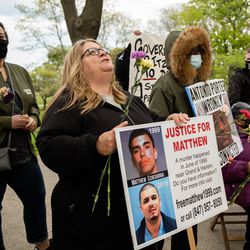Against a backdrop of bright pink tulips, protesters stood outside Gov. J.B. Pritzker’s Gold Coast home on Friday with flowers, signs and a painted piece of cardboard that read, “Dear J.B., on this Mother’s Day, set our loved ones free.”
That oversized Mother’s Day card included demands that Pritzker sign clemency petitions to for prisoners they say have been wrongfully incarcerated and that he stop construction of a new youth prison at the Lincoln Developmental Center.
Denice Bronis, an Elgin resident and member of Mamas Activating Movements for Abolition and Solidarity, said her son Matthew Echevarria, in prison for 22 years after being convicted of murder, contracted COVID-19 at Menard Correctional Center and still exhibits long-term symptoms.
“Mother’s Day is just as much a day of love as it is a day of pain, especially for those who have experienced forced separation from our children, our loved ones, by the state,” Bronis said.
The Illinois Department of Corrections started allowing in-person visits at all correctional centers on Monday, provided COVID-19 safety regulations are followed. During Phase 1 of its visitation plan, set to last for 60 days, physical contact is not permitted and clear plastic barriers separate incarcerated individuals and visitors.
Kiah Sandler, a Bronzeville resident with the End IL Prison Lockdown Coalition, said although the group’s demands have shifted since Pritzker signed a sweeping criminal justice reform bill, there is still work to be done by the governor.
Sandler said the coalition is asking Pritzker to lift that ban on personal contact during in-person visits, and also to grant more clemency requests to “set loved ones free with the stroke of a pen.”
“We just want people to be able to feel safe, we want families to be able to be families again,” Sandler said. “We want to honor the strength and resilience of those moms, caregivers, and chosen family who provide care across the bars and walls of prisons here in Illinois.”
The Mother’s Day card, signed by dozens of mothers, loved ones and supporters of those in prison, was shoved under the black metal gate in front of Pritzker’s mansion. A few protesters used the home’s intercom to alert the governor to the delivery — and repeat their demands. They received no response.
A Pritzker spokesperson later sent an email stating Pritzker has granted clemency requests throughout the pandemic and the state prison population is at its lowest level in years — down 28% since 2019, including a 43% drop in female inmates.
Holly Krig, a member of Moms United Against Violence and Incarceration, said it is “horrific and cruelly unnecessary,” that visitors and incarcerated people are not allowed to touch and also that visitors must be vaccinated; that means children under 16 — who can’t be vaccinated yet — can’t visit.
She said for younger children and newborns to maintain a relationship with incarcerated mothers, contact is essential.
“People can be released, people should be released and they should be released immediately,” Krig said. “We need to bring our people home.”



















